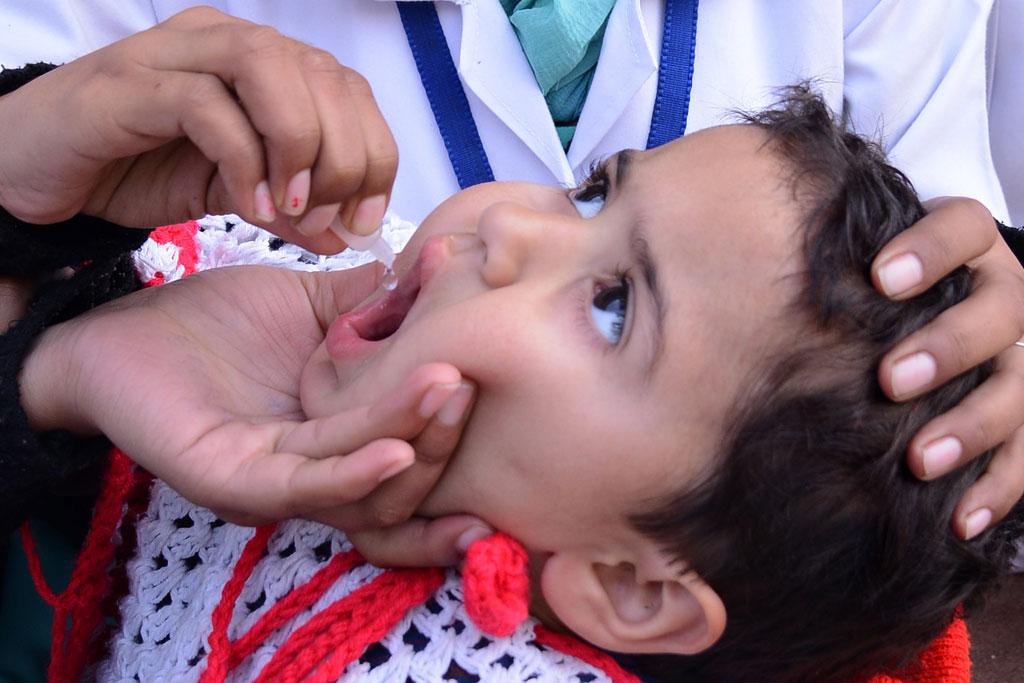The World Health Organization declared these 11 countries in Asia free of polio
An Indian child receives polio vaccination drops from a medical volunteer during a National Pulse Polio Immunisation (PPI) program in Amritsar on Jan. 19, 2014.
The World Health Organization officially certified India and 10 other Asian countries free of polio on Thursday, a milestone lauded as a "momentous victory" over an ancient scourge.
The other countries certified Thursday were Bangladesh, Bhutan, South Korea, Indonesia, Maldives, Myanmar, Nepal, Sri Lanka, Thailand and East Timor.
The Southeast Asian region, which includes India but excludes Afghanistan and Pakistan, was certified by a panel of experts after the countries went three years without reporting a single new case.
India's last case of the wild polio virus was detected in January 2011 in a two-year-old girl in the state of West Bengal.
Afghanistan, Pakistan and Nigeria are the only countries in the world left where the virus remains endemic, largely due to violent conflicts, weak health systems and poor sanitation.
More from GlobalPost: Pakistan: Where conspiracy theories can cost a child's life
"This ceremony … marks one of the biggest public health achievements," Poonam Khetrapal Singh, the WHO's Southeast Asia director, told diplomats and health officials at the event.
"It is a day that all countries fought hard for, and a day when all stakeholders come together to celebrate the victory of mankind over a dreaded disease that, for centuries, has killed and disabled legions."
Until the 1950s, polio crippled thousands every year in rich countries. It attacks the nervous system and can cause irreversible paralysis within hours of infection.
More from GlobalPost: Kabul discovers its first case of polio in 13 years
The highly contagious virus often spreads in areas with poor sanitation and children under five are the most vulnerable.
In 1988, the Global Polio Eradication Initiative — led by governments and supported by organizations such as WHO, Rotary International and the UN Children's Fund — was launched to ensure comprehensive, nationwide vaccination in endemic nations.
More than 350,000 children across 125 countries were being paralyzed or killed by polio every year at that time. That figure has since reduced by 99.9 percent and in 2013, just 406 cases of polio were reported.
India — where more than 50,000 children were afflicted with the virus every year — was considered one of the toughest places in the world to eradicate polio. Many families in poor, high-risk northern states such as Bihar and Uttar Pradesh migrate for work, while others live in remote areas.
Millions of health workers were involved in India's mammoth drive to immunize children by giving them polio drops.
They targeted migrant families at bus stations, on trains and at festivals. Some used motorcycles or trekked by foot to reach villages.
As a result, over 170 million children are now immunized every year, with millions more targeted in house-to-house visits in a drive which has cost the government $3 billion since 1995.
In 2009, 741 Indians fell sick with polio, nearly half the world's cases that year. The number dropped to 42 in 2010 and only one in 2011.
In Pakistan — the only country where polio cases are increasing — gunmen frequently attack polio workers, accusing them of being Western spies and part of a plot to sterilize Muslims. Earlier this month, militants killed 12 members of the security escort for a polio vaccination, detonating a roadside bomb before opening fire on their convoy.
In neighboring Afghanistan, a three-year-old girl was found in February to have contracted the first case of polio in the country's capital Kabul since 2001.
(Additional reporting by Shyamantha Asokan; Editing by Douglas Busvine and Nick Macfie)
The story you just read is accessible and free to all because thousands of listeners and readers contribute to our nonprofit newsroom. We go deep to bring you the human-centered international reporting that you know you can trust. To do this work and to do it well, we rely on the support of our listeners. If you appreciated our coverage this year, if there was a story that made you pause or a song that moved you, would you consider making a gift to sustain our work through 2024 and beyond?
